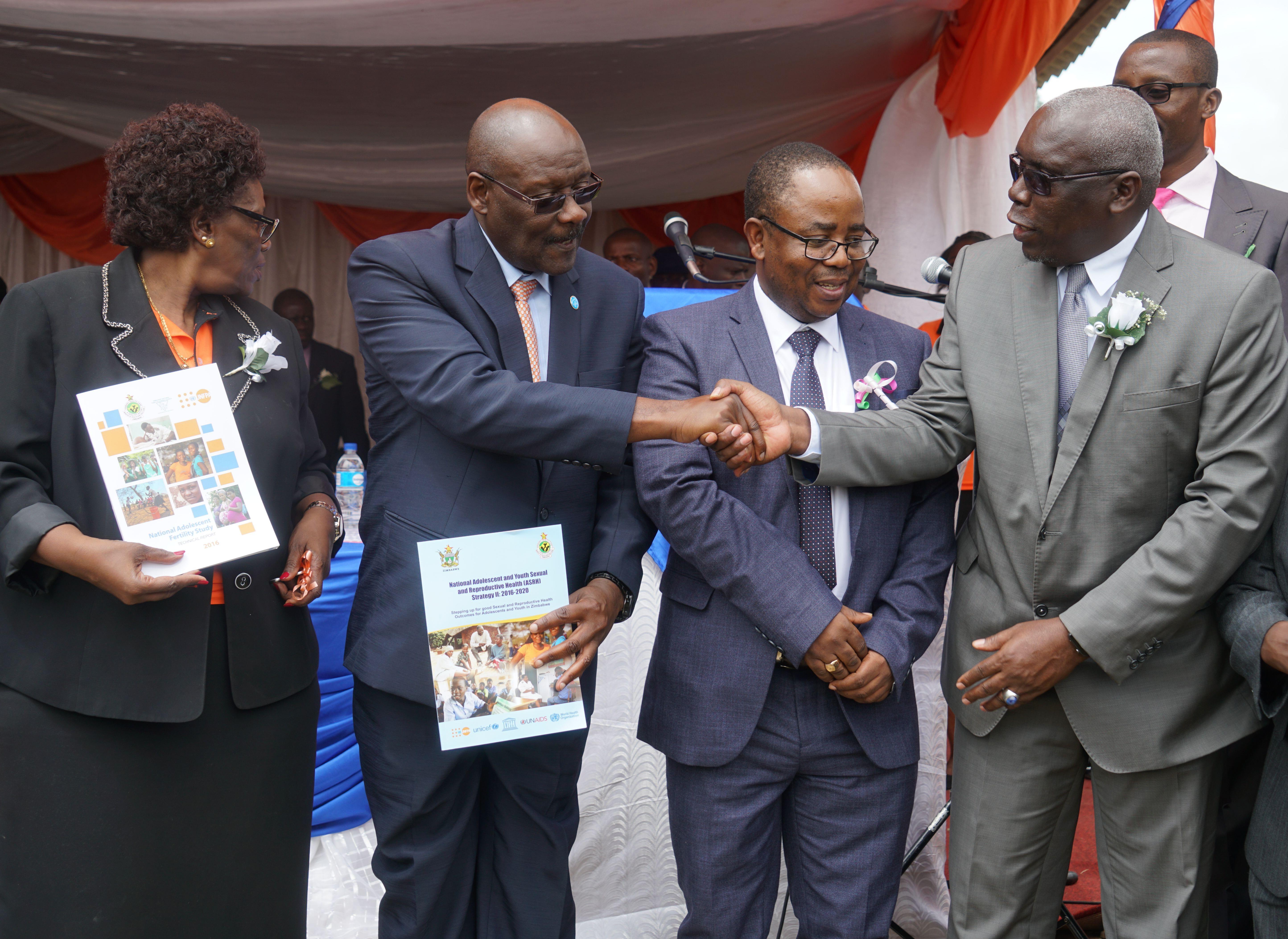St. Albert’s Mission Hospital, 10 March – The Government of Zimbabwe (GoZ) and the United Nations Population Fund (UNFPA), today launched the findings from the National Teenage Fertility Study which shows that teenage pregnancy remains a huge problem in Zimbabwe with an adolescent fertility rate for women aged 15-19 years at 110 per 1,000 women. This means that 1 in 10 adolescent girls give birth every year.
The GoZ and UNFPA also launched the National Adolescent Sexual Reproductive Health (ASRH) Strategy II (2016-2020), which was informed by the National Teenage Fertility Study. The ASRH II strategy seeks to, among other objectives, tackle this evident challenge of teenage pregnancy in Zimbabwe.
Zimbabwe has an extremely young population with a third being between the ages of 10-24 years. Twelve percent (12%) of the population is comprised of adolescent girls aged 10-19 years who face a myriad of challenges related to their development and sexual reproductive health. One quarter of these adolescent girls are married by the age of 18 years, with 24% falling pregnant (MICS 2014). The rural–urban differential is striking with the fertility rate being twice as high among girls resident in the rural areas.
The National Teenage Fertility Study was conducted by the Ministry of Health and Child Care (MoHCC), Zimbabwe National Family Planning Council and UNFPA, in an effort to identify the causes and extent of the challenge of teenage pregnancy in Zimbabwe, including hotspots as well as socio-demographic, economic and cultural factors in order to develop a comprehensive national teenage pregnancy prevention programme, as part of national ASRH strategy.
The study’s findings, launched at St. Albert’s, revealed that 9% of female adolescents aged 10-19 years had ever been pregnant. Factors significantly associated with adolescent pregnancy were a lack of comprehensive knowledge and poor attitudes towards sexual reproductive health among teenage girls; only 4% of those aged 10-19 years had comprehensive knowledge on pregnancy and 77% believed that “contraceptive (condoms and pills) use is a sign of promiscuity”, highlighting the need for increased Comprehensive Sexuality Education (CSE) among this extremely vulnerable demographic.
Early sexual debut, sexual abuse and child marriage were found to significantly increase the risk of unintended pregnancies among teenage girls; 13% of girls aged 10-19 years reported having a sexual encounter while 54% aged 10-14 years who had ever had a sexual encounter experienced rape or forced sex on their first sexual encounter. Almost a fifth (19%) of pregnancies among female adolescents aged 15-19 years was associated with early marriage.
The five year national ASRH strategy, officially launched by Hon. Minister of Health and Child Care Dr. Parirenyatwa, aims to tackle these challenges by scaling up the work initiated in the implementation of the first ASRH Strategy (2010-2015) with a focus on sustained healthy behaviour uptake by young people, and ensuring quality multi-sectoral ASRH services are available supported by a protective legal and policy environment.
“Teenage pregnancy severely curtails girls and young women’s opportunities and hinders their ability to reach their full potential,” UNFPA Country Representative Cheikh Tidiane Cisse.
“Teenage pregnancy severely curtails girls and young women’s opportunities and hinders their ability to reach their full potential,” said UNFPA Country Representative Cheikh Tidiane Cisse.
“A young adolescent girl can be an asset for her country if she is not married off during her childhood; not forced to leave school or exposed to unplanned and early pregnancies that put her at high risk of illness, maternal morbidities and even death,” Mr Cisse said.
Both the national ASRH teenage fertility study and the development of the ASRH strategy were supported by UNFPA under the Integrated Support Programme (ISP), supported by the governments of Britain, Ireland and Sweden. The strategy will be implemented under the Health Development Fund, supported by the ISP donors and the European Union.
The five year national ASRH strategy, officially launched by Hon. Minister of Health and Child Care Dr. Parirenyatwa, aims to tackle these challenges by scaling up the work initiated in the implementation of the first ASRH Strategy (2010-2015) with a focus on sustained healthy behaviour uptake by young people, and ensuring quality multi-sectoral ASRH services are available supported by a protective legal and policy environment.
The ASRH strategy also encourages multi-sectoral evidence based interventions with close linkages and integration, emphasizing the essential role of education, protection and sustainable livelihoods for young people and the need for greater investment in young people as a key driver in reaping the demographic dividend in the future.


